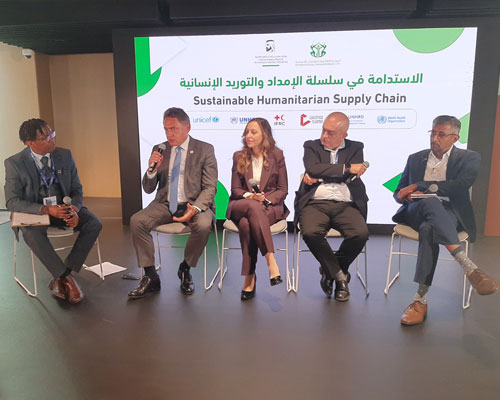
08 – December 2023 – Dubai’s International Humanitarian City (IHC) organized a pivotal conference on December 6, 2023, centering on the critical theme of cultivating a Sustainable Humanitarian Supply Chain. Held on the sidelines of COP28, this significant event saw a convergence of leaders, stakeholders, and experts from various sectors, collectively emphasizing the urgency and impact of sustainability in humanitarian endeavors.
The discussions echoed a unified Call to Action within the humanitarian community:
- The urgent need for immediate action was emphasized, underlining that past promises are insufficient, and the time for actionable measures is now.
- Speakers highlighted the humanitarian imperative and the pressing challenge of balancing immediate needs with sustainable practices in humanitarian response efforts.
- It was underscored that reducing the carbon footprint in humanitarian assistance goes beyond logistical considerations; it necessitates a comprehensive reevaluation of the entire ecosystem.
- A unified goal and interest were expressed in aligning the humanitarian supply chain with global commitments, such as the Paris Agreement, and broader goals set by the humanitarian community.
- Partnerships were identified as crucial across sectors, including the private sector, academia, governments, international organizations, and the UN. These collaborations are pivotal in driving legislative integration, innovation, and the adoption of circular practices to minimize environmental impact while responding effectively to humanitarian crises.
The conference highlighted a transformative shift in humanitarian practices, emphasizing a profound awareness of environmental impact while addressing immediate needs, marking 2023 as a pivotal year for reshaping humanitarian supply chain strategies.
Giuseppe Saba, CEO of Dubai’s International Humanitarian City, emphasized the power of partnership in the opening remarks and gave an overview of the journey that began in March 2023, marking the 20th anniversary of IHC in the humanitarian field. He said, “This is where some ‘Dreamers’ started in, paving the way to COP28. – 2023 will be remembered as the year when, at the margin of COP28, the Dreamers solicited a sustainable humanitarian supply chain.”
The event featured a panel discussion moderated by Benjamin Safari, Head of Supply Chain Management at UNHCR, with the participation of Simon Missiri, Special Representative of IFRC, Francesca Cocozza, Director of NRS Relief, Raji Hattar, Chief Sustainability Officer at Aramex, and Sherring Thekekkara, the Global Executive Vice President of DP World Logistics.
The discussions underscored the importance of collective responsibility and collaboration among stakeholders to transition toward a more sustainable humanitarian future, wherein the emphasis lies not only on immediate response but also on long-term environmental impact mitigation.
Simonetta Di Pippo, Director of SEELab at SDA Bocconi & NYUAD visiting professor, and former director of the UN Office for Outer Space Affairs, delivered the closing remarks, emphasizing the challenges in the fight against climate change impact, and the crucial importance of commitment and action in the context of sustainability.
Notably, the conference marked the launch of a Call to Action, urging collective responsibility and collaboration among stakeholders to transition toward a more sustainable humanitarian future. This Call to Action emphasizes the imperative of including carbon emissions in supply chain planning processes and adopting low-carbon solutions within the humanitarian sector.